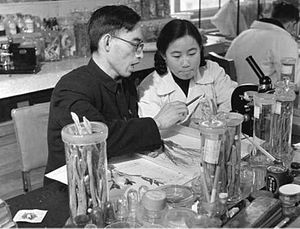“Tu Youyou makes a better Chinese symbol than the panda, the dragon, or the Great Wall,” a friend declared the other day. I have no idea how widespread a conceit this is, but I’ve lately heard it several times, and to me it makes perfect sense.
Tu was jointly awarded this year’s Nobel Prize in Physiology or Medicine for discovering the antimalarial drug artemisinin (the other joint winners were William C. Campbell and Satoshi Omura for their discovery of the anthelmintic avermectin). Tu became the first Chinese winner in the field of medicine and the first female Chinese Nobelist.
Moreover, her trajectory makes her an easy emblem of a once impoverished nation coming up in the world. As you may have heard, Tu is the san wu kexuejia or the “Three Without Scientist.” In other words, she doesn’t have a doctorate, she’s never studied abroad, and she is not a member of the Chinese Academy of Sciences.
Her story resonates in other ways too. Americans, with their love of liberty and individualism, glorify the pathos of the lonesome cowboy (or the abandoned astronaut). Riding off into the sunset, alone, represents victory in American culture. But Chinese aren’t as attracted to the hubris of the fearless gunslinger.
Indeed, calling oneself diaosi or “loser” can for some Chinese be a badge of honor. Neither do Chinese so openly celebrate individuality. As Tu herself recently noted, “foreign countries like the United States care a lot about which individual should claim credit,” while “Chinese awards are always given to teams.”
Tu emphasized that the reward belongs not only to her, but to her team and nation as well. So here we have the story of a woman who, despite acute disadvantages, reached the height of success. Who can blame Chinese for seeing in this a reflection of their own country’s recent past? Especially when Tu herself claims that her success isn’t individual, but national.
Furthermore, while many embrace the diaosi label, others recall the old dongya bingfu or “sick man of Asia” trope, casting China as the underdog set for a comeback or, if you will, a “peaceful rise.” This particular notion presented itself quite clearly prior to the Beijing Olympics when Sohu, the official online sponsor of the Games, described China’s transition “from the sick man of Asia to Olympic power.” The sentiment was later repeated again and again and again, and was, one writer notes, “wildly used” by Chinese media whenever Chinese athletes won medals.
Is it any wonder then that characters like Kung Fu Panda’s Po or Monster Hunt’s Wuba, who seem like losers at first but whose fates are downright messianic, are so hugely popular in China? It’s a tune that hits more dramatic chords than the American anthem, but also one that’s more filled with hope, which is why Tu is such a splendid symbol. Her work has saved millions of lives and changed the world in ways we will probably never fully be able to quantify. And her story is in many ways the story of modern China, the perceived diaosi of Asia now finally proving to the world that it is retaking its rightful place as leader.

































